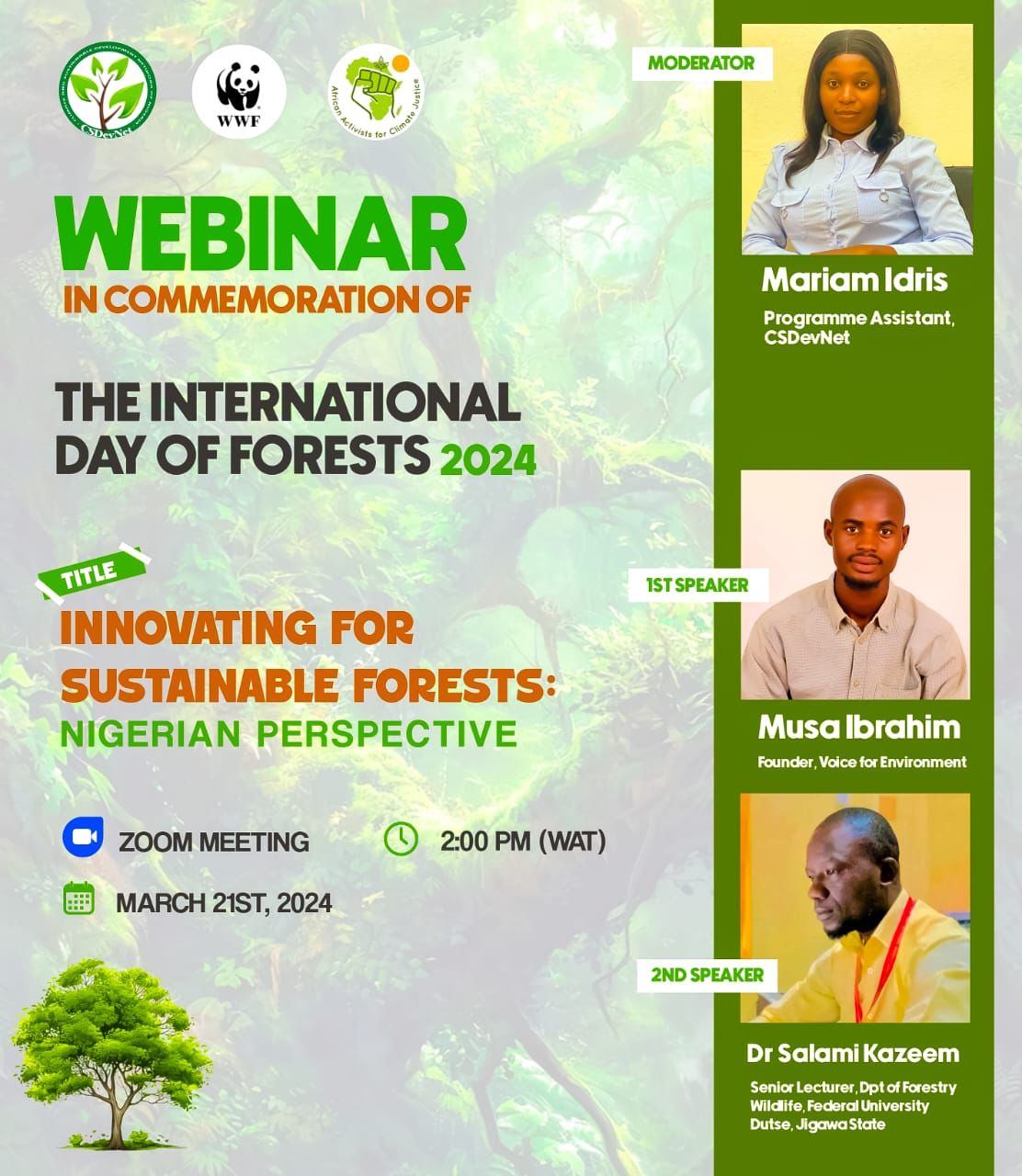
Report by Mariam Idris
In commemoration of the International Day of Forests themed: “Forests and Innovation”, the Climate and Sustainable Development Network (CSDevNet) hosted a thought-provoking webinar featuring two experts, Dr. Salami Kazeem (Ph.D., AMNIM), Department of Forestry and Wildlife Management, Federal University Dutse, Jigawa State, and Mr. Ibrahim Musa, the Founder Voice for Environment, held on March 21, 2024.
The innovative approaches discussed to sustainable forest management, biodiversity conservation, and climate change resilience in a Nigerian context.
The webinar, led by the Programme Assistant of CSDevNet, Miss Mariam Idris, aimed to raise awareness about the crucial role forests play in mitigating climate change. It also sought to inspire participants to develop innovative solutions for forest preservation and sustainable development.
The Programme Officer Mr. Paul Joseph, in his welcome remarks, emphasised the critical need for innovative solutions to address the pressing challenges faced by Nigerian forests. He highlighted the importance of the International Day of Forests in fostering a sense of urgency around forest conservation.
Dr. Salami Kazeem, the first speaker, shed light on several innovative conservation methods. He emphasised the multifaceted benefits of forests, including timber resources, ecological balance, micro-climate regulation, erosion control, and watershed management.
Dr. Kazeem stressed the importance of sustainable forest use and management practices to ensure the long-term viability of these vital ecosystems. He argued that by combining forest functionality with sustainability, we can achieve superior conservation outcomes while creating alternative resources for local communities.
“Governments should allocate substantial amount in the forest reserve which in turn help to boost the economy of the country in the exportation of textile and other viable resources where forestry provides raw materials,” said Dr. Salami.
Drawing on research by Robert and Tony (2020), Dr. Kazeem showcased specific solutions like biological biodiversity enhancement and landscape restoration. He used the example of the degraded Omofora forest reserve in southern Nigeria to illustrate these methods.
He championed mangrove restoration, highlighting its effectiveness as a carbon sink. And also advocated for the adoption of smart agricultural practices and government investment in forest reserves to bolster the economy through the exportation of raw materials.
Mr. Musa Ibrahim an expert offered a Nigerian perspective, underlining the crucial role forests play in carbon sequestration, global livelihood support, and biodiversity conservation.

He lamented the alarming rate of global deforestation (12 million hectares annually) and emphasised the vital role forests play in maintaining the health of our planet’s ecosystems.
Sadly, he noted that “12million hectares of forest is lost annually stating Forest is the Lungs of the Earth”.
Mr. Ibrahim discussed the specific challenges faced by Nigerian forests, including desertification in the Sahel region, illegal poaching, and sand dune encroachment in the northeast. He highlighted the diverse benefits provided by forests, ranging from food and medicine to climate regulation and pollination services.
“An idea of Agro-forestry will go a long way in conversing forest,” said Ibrahim.
He explored the potential of innovative technologies such as drones with motion and thermal sensors, smart fences, virtual reality, and camera traps to enhance forest monitoring and protection.
Agroforestry emerged as a promising strategy for forest preservation, alongside genetic conservation techniques to address future food security challenges.
The webinar concluded with a key takeaway: innovation transcends mere technological advancements. It encompasses indigenous knowledge and creative solutions.
Both Dr. Salami and Mr. Ibrahim emphasised the importance of holistic approaches that integrate smart agriculture, biodiversity conservation, and robust tree-planting initiatives to safeguard Nigeria’s forests and foster sustainable development.
As we face mounting environmental challenges, CSDevNet is open to collaboration and commitment to innovation are critical to ensuring the longevity and vitality of our forests.
This Nigerian perspective underscores the urgency of action and the transformative potential of innovative solutions in preserving our invaluable natural heritage.
